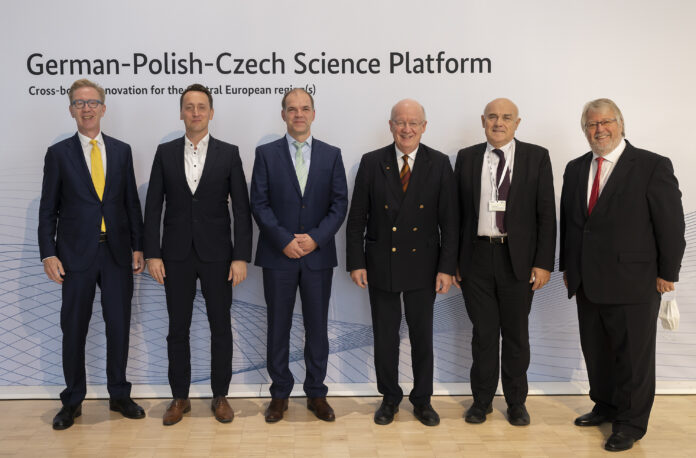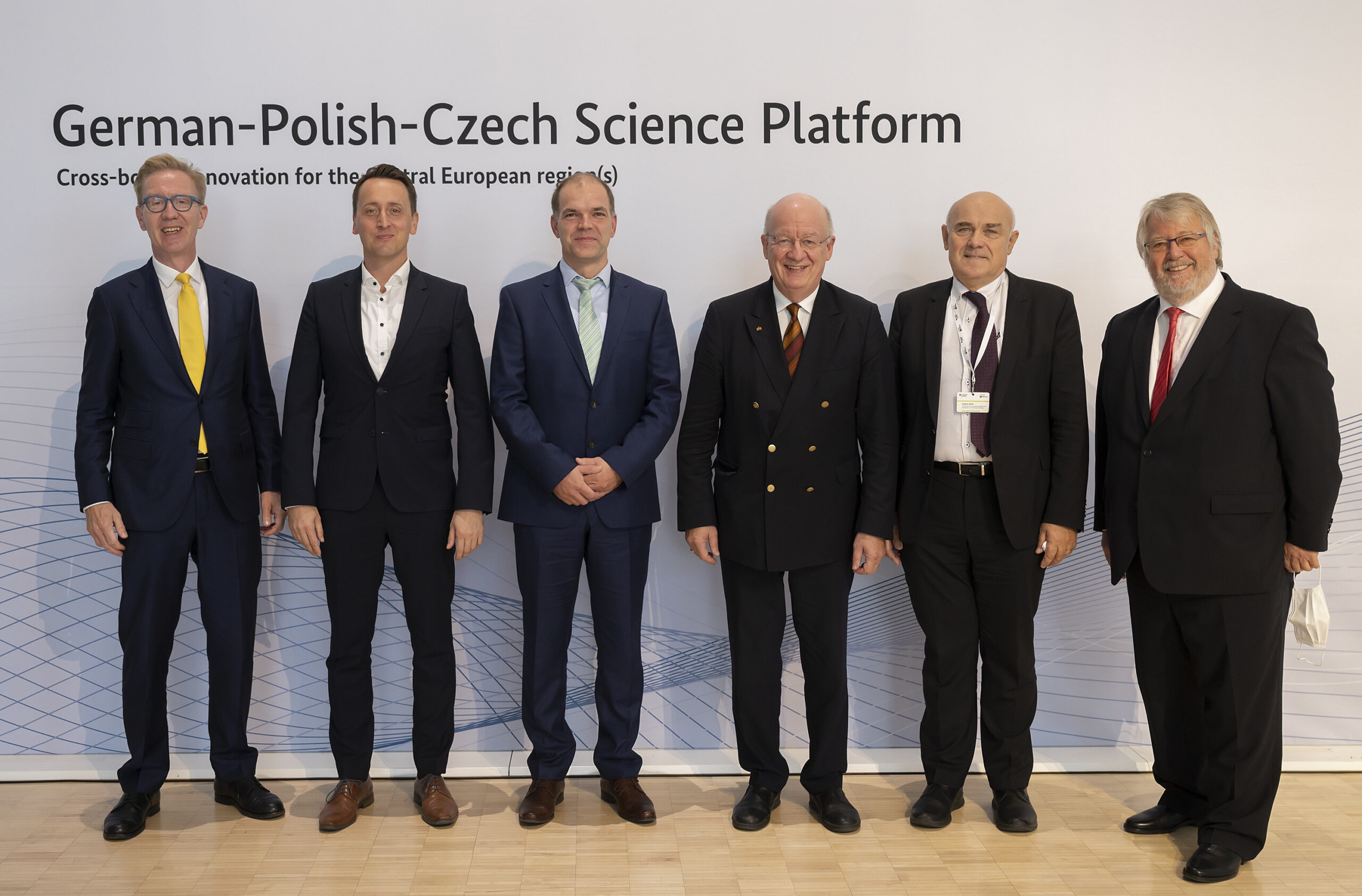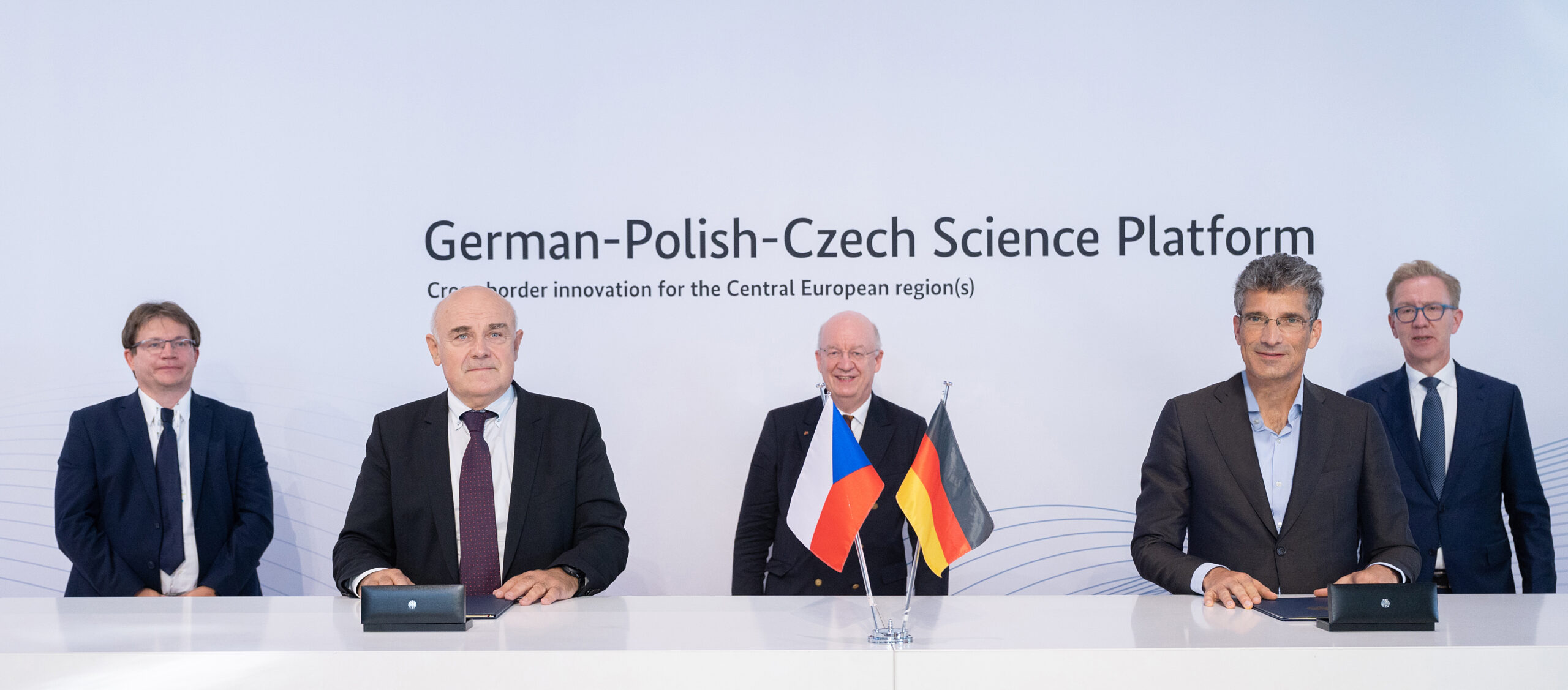
At the trilateral science conference „German-Polish-Czech Science Platform“, Prof. Dr. Vladimir Mařík, scientific director of the Czech Institute of Informatics, Robotics and Cybernetics (CIIRC) at the Czech Technical University in Prague (CTU) and DFKI CEO Prof. Dr. Antonio Krüger signed a Memorandum of Understanding. The ceremony took place in Dresden on Oct. 8, 2021, in the presence of Prof. Dr. Wolf-Dieter Lukas, State Secretary at the German Federal Ministry of Education and Research (BMBF), Petr Očko, Deputy Minister at the Ministry of Industry and Trade of the Czech Republic, and Prof. Dr. Wolfgang Wahlster, DFKI Chief Executive Advisor.

Foto: Hans-Joachim Rickel, BMBF
The aim is to intensify the cooperation between the two partners, which has been in place for more than five years. Based on their long-standing collaboration and intensive dialog, the joint European research project RICAIP and the close cooperation within the European AI initiative CLAIRE, the DFKI and CIIRC would like to structure their partnership and further expand their cooperation in the field of Artificial Intelligence and Industry 4.0, especially industrial AI. One of the core projects will focus on the five main trends of the current phase of INDUSTRIE 4.0: Zero Defect Production, Explainable AI Solutions for Collaboration in Hybrid Human-Robot Teams, Integration of Machine Learning Methods Using Semantics, 5G Communication on the Factory Floor, and Standardization of Production System Software.
„The Czech Republic and Germany both have strong, export-oriented and industrial SMEs with comparable innovation needs. Together, CIIRC and DFKI can better align their research in the field of industrial AI with the requirements of the country-specific economy and thus expand the technological basis for globally competitive production goods, services and business models,“ said Prof. Dr. Antonio Krüger.
“The document clearly defines strong directions in which scientific cooperation and joint projects of our both institutions will develop in accordance with the current needs of industry, which we have identified in interaction with key companies in both countries. It declares the future trends in the 2nd phase of Industry 4.0 research and is a good precondition for coordinated bilateral collaboration as well as for joint actions in the European Research Area in this respect,” expressed Prof. Vladimír Mařík.
One of the core projects focus on the five main trends of the current phase of Industrie 4.0: Zero Defect Production, Explainable AI Solutions for Collaboration in Hybrid Human-Robot Teams, Integration of Machine Learning Methods Using Semantics, 5G Communication on the Factory Floor, and Standardization of Production System Software.
The DFKI and CIIRC CTU have already been working closely together since 2016 in researching new opportunities for human-robot collaboration (MRK 4.0) and in the field of Industrie 4.0. The MRK 4.0 Innovation Lab, which was founded at the time, provides for German and Czech scientists to work together on solutions for human-machine interaction. This is not concerned with the development of new types of robots, but exclusively with interaction in human-robot teams. The lightweight robots used come from different manufacturers and have different capabilities. The initial equipment of the innovation lab in Saarbrücken was financed by the Federal Ministry of Education and Research with 1 million euros.
The objective of the MRK 4.0 innovation lab is the concrete testing and implementation of human-robot collaboration for Industry 4.0 in a European context and across national borders. MRK 4.0 focuses on collaborative manufacturing at distributed locations and on the feasibility of the principles of distributed production and remote human-robot collaboration.
Since 2019, the innovation lab has been part of the European research project RICAIP (Research and Innovation Centre on Advanced Industrial Production) and functions therein as an MRK testbed together with its counterparts in Prague and Brno. The objectives of RICAIP include the development and application of virtual and augmented reality for remote industrial production control and systems for rapid adaptation to the customer’s current needs and available production resources. In RICAIP, CIIRC CTU and DFKI cooperate with the Center for Automation Technology (ZeMA) in Saarbrücken and the Central European Institute of Technology Brno University of Technology (CEITEC BUT).
With the „German-Polish-Czech Science Platform“, Germany, Poland and the Czech Republic want to intensify the pooling of forces in research and innovation in order to strengthen Central European innovation regions and provide new impetus for regional development across all of Europe. At the invitation of Federal Research Minister Anja Karliczek in cooperation with the Minister-President of Saxony Michael Kretschmer, the conference at the Gläserne Manufaktur in Dresden on 8 and 9 October brought together the President of the German Bundestag, Wolfgang Schäuble, the Prime Minister of Poland, Mateusz Morawiecki, and Deputy Minister at the Ministry of Industry and Trade of the Czech Republic, Petr Očko, as well as further representatives from politics, science and research in the border triangle. Participants discussed opportunities and challenges of research and innovation for the sustainable economic development of Central Europe.



